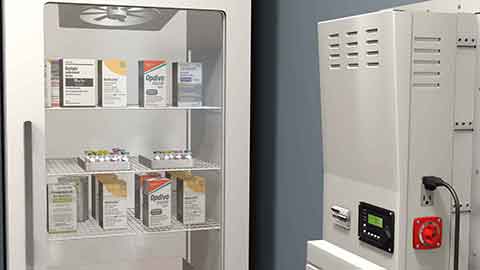Vaccine Refrigerator Power Outage
A vaccine refrigerator power outage is the bane of vaccine storage because the temperatures at which you store your facility's vaccines are vital to their effectiveness. If a facility's vaccine refrigerator experiences a power outage, the outage cost can be high for them.
Aside from the cost of the compromised vaccines, they will have to bear the costs of restocking and revaccinating patients (if they had mistakenly administered the compromised vaccines). To combat these, the Centre for Disease Control (CDC) curated some guidelines for vaccine storage to which healthcare facilities are expected to adhere.
One purpose of these guidelines is to help facilities protect their vaccines during an emergency power outage. This article discusses what you should know about vaccine refrigerator power outages and what to do when you experience one.
4 Options To Prevent A Vaccine Fridge Power Failure:
The CDC guidelines recommend that every healthcare facility have a backup plan for a power outage. We will discuss the following four different types of backup plans, and the advantages/disadvantages of each:
- Transporting the vaccines
- Using an ice-lined refrigerator
- Installing an outdoor fuel generator
- Installing a battery-powered backup
This article will examine each of these backup plans to vaccine refrigerator power outages, detailing the pros and cons of each. At the end of the article, you will have all the data you need to decide which backup plan or combination of plans will work best for your facility.
Option #1: Transport the Vaccines
Here, you will need to transport the vaccines to another facility whose vaccine storage refrigerators are functioning. The facility could be a local hospital, clinic, health department or pharmacy.
Requirements:
- An adequate number of transport containers
- Lots of ice packs
- Thermometers
- Flashlights
- Other emergency material, including your facility’s standard operating procedure for vaccine transport
This plan is the least desirable, but every facility should have it on tap if other plans fail or the power outage takes longer than envisaged, making the other plans ineffective.
Advantages of Transporting Vaccines:
- It is cost-effective, as you can implement it with a couple of hard-sided coolers and lots of frozen water bottles.
- It provides an option independent of your facility's emergency backup plans.
Disadvantages of Transporting Vaccines:
- It requires extensive preparation on your part. This includes:
- Having a list of emergency contacts,
- Ensuring that all equipment has data loggers attached to them,
- Having a secure backup power source
- Posting an emergency plan
- Training your staff ahead of time
- Ensuring that relevant staff have access to the building especially after-hours
- It includes an element of risk and a pretty large margin for error, as many variables can upset your well-laid plans.
- It is not foolproof: depending on another facility for your vaccine storage will serve you only if the outage was restricted to your facility or the immediate location (and the other facility is not located near you). If the outage had a larger radius, the chances are that the facility you were banking on would also be affected. Also, they may not have sufficient space to accommodate your vaccines in addition to theirs.
Option #2: Use An Ice-Lined Refrigerator
This type of backup plan requires you to use a thickly insulated refrigerator whose thickly insulated walls and chest-style design help to retain temperatures longer than regular upright refrigerators.
Advantages of Using An Ice-Lined Refrigerator:
- It is energy-efficient as these refrigerators consume little power and run well on battery backup.
Disadvantages of Using An Ice-Lined Refrigerator::
- The chest refrigerator is bulky; thus, it takes a lot of floor space. This will prove inefficient in facilities where space is limited, thus making it a poor choice.
- Limited storage capacity due to the thickly insulated walls
- While they maintain steady temperatures for longer than upright refrigerators, they can’t do so for extended periods. Thus, the temperature in the chest refrigerators will rise steadily for as long as the power outage is on.
- Its design makes it inefficient for daily use, as the vaccines will be stacked on one another in the refrigerator, restricting access to vaccines at the bottom. Additionally, it does not have a fan to circulate air, which means that the temperature in the refrigerator will not be even throughout.
Option #3: Use An Outdoor Fuel Generator
This type of backup plan is more dependable than the first two. However, it is not without its challenges, as well.
Advantages of Using An Outdoor Generator:
- It runs for as long as you need, provided there is an adequate fuel supply.
- It is powerful enough to power your entire building, including all your refrigerators, so that you do not need to relocate your vaccines.
Disadvantages of Using An Outdoor Generator:
- It requires a hefty capital investment to purchase the generator, install it, run cabling through the building from the generator to the electrical panel, get all the required permits, and keep it fueled.
- It requires lots of space.
- The hefty capital investment means that it is not a one-size-fits-all solution. For example, if you leased the place your facility is located, it may not be a smart move to shell out so much money in a space you do not own.
- It requires regular maintenance.
Option #4: Use A Battery Backup System
A battery-powered backup is the most dependable and cost-effective of all four as it combines the reliability of the fuel generator with the energy efficiency of the ice-lined refrigerator. It also removes the hassles of relocating your vaccines every time you have a vaccine refrigerator power outage, and no one does these better than our battery backup for vaccine refrigerator.
Our systems are designed such that you do not have to concern yourself with switching power sources when outages happen. The smart technology imbued in them means that they can switch automatically to battery power when a power outage occurs.
Advantages of Using A Battery Backup System
- It is simple to install, as our products are designed to be “plug and play”. All you need to do is plug it into an existing wall outlet, and you are good to go.
- Cost-effective, as you don't need specialized help for installing or getting permits to install.
- It is flexible, as you can add batteries to existing systems to increase their run time. Also, you can size it to a varied number or combination of appliances.
- Efficient space usage, as it uses less than one square foot of floor space
- It requires no maintenance, as it comprises solid-state electronics that have no moving parts to wear out.
- Its plug-and-play design makes it easy to test whether it is working. For example, any facility staff can test the system simply by unplugging to simulate a power outage.
- It comes with an optional power outage alert system that notifies up to three numbers when the power goes out.
Disadvantages of Using A Battery Backup System
It requires that its batteries be replaced every four years, at the cost of up to 20% of that of the existing system.
Learn More About Battery Backup Power
To answer even more of your questions and find additional solutions to problems that could affect your medical facility or laboratory, check out these other articles from the Medi-Products blog and the Medi-Products Learning Center:
How a Battery Backup Generator Saves You Money
Battery Powered Rechargeable Generators, Explained.
What Size Generator is Needed to Run a Refrigerator


